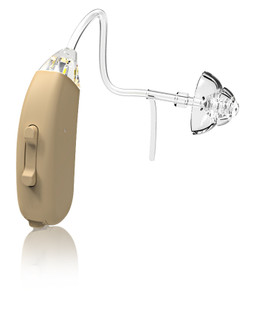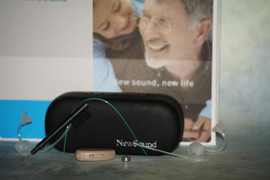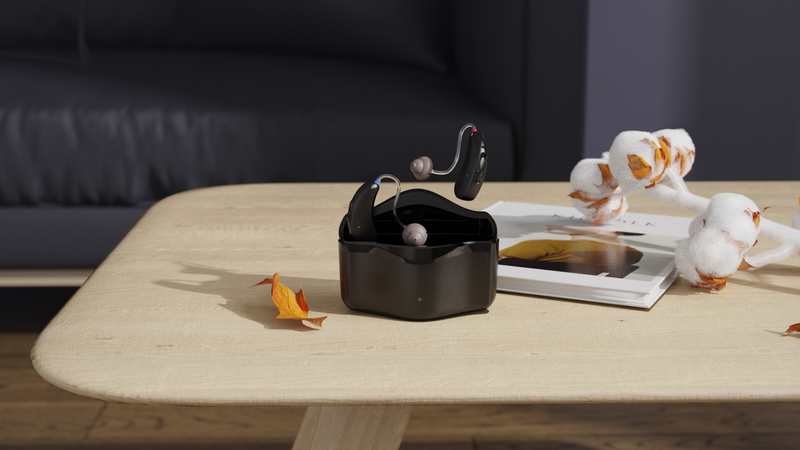The Secret Behind Bluetooth Hearing Aids Pros and Cons
Posted by DR Paul on Jun 29, 2024
Bluetooth technology has revolutionized various aspects of our daily lives, and hearing aids are no exception. For older Americans and people with hearing loss, understanding the benefits and drawbacks of Bluetooth hearing aids can be the key to making informed decisions about their hearing health. This blog post will provide a detailed analysis of the pros and cons of Bluetooth hearing aids, aiming to help hearing aid users better understand this innovative technology.
Understanding Bluetooth Hearing Aids
Bluetooth hearing aids are digital devices that connect wirelessly to other devices using Bluetooth technology. This innovation allows users to stream audio directly from their smartphones, televisions, and other Bluetooth-enabled devices. But how does this technology enhance the overall experience for hearing aid users?
How Bluetooth Works in Hearing Aids
Bluetooth hearing aids contain tiny Bluetooth chips that enable them to communicate with other Bluetooth devices. When paired, these hearing aids can receive audio signals directly from the source, bypassing the need for external accessories. This seamless integration offers a range of benefits, but it also comes with some challenges.
Advancements in Digital Hearing Aids
Digital hearing aids have come a long way from their analog counterparts. With advanced features like noise reduction, feedback cancellation, and customizable sound profiles, digital hearing aids offer superior sound quality. Bluetooth technology enhances these features by providing a direct link to various audio sources.
The Popularity of Bluetooth Hearing Aids
The popularity of Bluetooth hearing aids has surged in recent years, as more people recognize the convenience and improved sound quality they offer. However, it's essential to weigh the pros and cons before deciding if Bluetooth hearing aids are the right choice for you.
Pros of Bluetooth Hearing Aids
Bluetooth hearing aids offer numerous advantages that can significantly improve the listening experience for users. Here are some of the most notable benefits:
Improved Sound Quality
One of the primary benefits of Bluetooth hearing aids is the enhanced sound quality they provide. By streaming audio directly from the source, these hearing aids deliver clearer and more natural sound. This improvement can make a significant difference in everyday listening situations, such as watching TV or talking on the phone.
Seamless Connectivity
Bluetooth hearing aids allow users to connect seamlessly to various devices, including smartphones, tablets, and televisions. This connectivity makes it easier to stay connected with loved ones, enjoy entertainment, and participate in virtual meetings. The convenience of wireless streaming eliminates the need for additional accessories, making it simpler to manage multiple devices.
Customizable Settings
Many Bluetooth hearing aids come with smartphone apps that enable users to customize their listening experience. These apps allow users to adjust volume levels, switch between different sound profiles, and even locate misplaced hearing aids. The ability to personalize settings ensures that users can achieve the best possible listening experience in various environments.
Enhanced Communication
Bluetooth hearing aids can significantly improve communication by providing clearer sound during phone calls and video chats. This feature is especially beneficial for older Americans who may struggle with traditional phone calls. By streaming audio directly to the hearing aids, users can enjoy more natural and engaging conversations.
Cons of Bluetooth Hearing Aids
While Bluetooth hearing aids offer many benefits, they also come with some potential drawbacks. It's essential to consider these cons when deciding if Bluetooth hearing aids are the right choice for you.
Higher Cost
Bluetooth hearing aids tend to be more expensive than their non-Bluetooth counterparts. The advanced technology and additional features contribute to the higher price tag. For some users, the increased cost may be a significant barrier to adopting Bluetooth hearing aids.
Battery Life
Bluetooth hearing aids typically consume more battery power than traditional hearing aids. The constant wireless connection can drain batteries quickly, requiring users to recharge or replace them more frequently. This increased demand for power can be inconvenient, especially for those who rely on their hearing aids throughout the day.
Potential Connectivity Issues
While Bluetooth technology has come a long way, it is not without its flaws. Users may experience connectivity issues, such as dropped connections or interference from other devices. These problems can be frustrating and may affect the overall listening experience.
Learning Curve
For some users, especially older adults, adapting to Bluetooth hearing aids may require a learning curve. The need to pair devices, use smartphone apps, and manage settings can be overwhelming for those who are not tech-savvy. It's essential to provide adequate support and resources to help users become comfortable with their new hearing aids.
Comparing Bluetooth Hearing Aids to Traditional Hearing Aids
When deciding whether to invest in Bluetooth hearing aids, it's essential to compare them to traditional hearing aids. Understanding the differences between these two types of devices can help users make informed decisions about their hearing health.
Sound Quality
While traditional hearing aids have improved significantly over the years, Bluetooth hearing aids often provide superior sound quality. The ability to stream audio directly from the source can make a noticeable difference in clarity and naturalness. However, traditional hearing aids may still be suitable for those who do not require advanced features.
Convenience and Connectivity
Bluetooth hearing aids offer a level of convenience and connectivity that traditional hearing aids cannot match. The ability to connect seamlessly to various devices and customize settings through smartphone apps makes Bluetooth hearing aids a more versatile option. However, traditional hearing aids may be more straightforward for those who prefer a simpler listening experience.
Cost and Accessibility
Traditional hearing aids are generally more affordable than Bluetooth hearing aids, making them a more accessible option for many users. However, the additional cost of Bluetooth hearing aids may be justified for those who can benefit from the enhanced features and improved sound quality.
Tips for Choosing the Right Bluetooth Hearing Aid
If you've decided that Bluetooth hearing aids are the right choice for you, here are some tips to help you choose the best device for your needs:
Assess Your Listening Needs
Consider your daily listening environments and the specific challenges you face. Do you frequently use the phone or watch television? Are you often in noisy environments? Understanding your listening needs can help you choose a Bluetooth hearing aid with the right features.
Research Different Brands and Models
There are many different brands and models of Bluetooth hearing aids on the market, each with its unique features and benefits. Take the time to research and compare different options to find the best fit for your needs. Look for reviews and testimonials from other users to gain insight into the performance and reliability of various devices.
Consult with a Hearing Care Professional
A hearing care professional can provide valuable guidance and recommendations based on your specific hearing needs. They can help you choose the right Bluetooth hearing aid and ensure it is properly fitted and programmed for optimal performance.
Maintaining Your Bluetooth Hearing Aids
Proper maintenance is essential to ensure your Bluetooth hearing aids continue to perform at their best. Here are some tips for keeping your devices in top condition:
Regular Cleaning
Keep your hearing aids clean by wiping them down with a soft, dry cloth regularly. Avoid using water or cleaning solutions, as these can damage the delicate components. Consider using a hearing aid cleaning kit for more thorough cleaning.
Battery Management
Monitor your battery levels and replace or recharge them as needed. Keeping spare batteries or a portable charger on hand can help ensure you never run out of power when you need it most.
Software Updates
Many Bluetooth hearing aids receive software updates that can improve performance and add new features. Stay up-to-date with the latest updates by regularly checking your hearing aid manufacturer's website or app.
The Future of Bluetooth Hearing Aids
The future of Bluetooth hearing aids looks promising, with ongoing advancements in technology and innovation. Here are some trends and developments to watch for in the coming years:
Improved Connectivity
As Bluetooth technology continues to evolve, we can expect improved connectivity and fewer issues with interference and dropped connections. This development will enhance the overall user experience and make Bluetooth hearing aids even more reliable.
Enhanced Features
Future Bluetooth hearing aids may come with even more advanced features, such as real-time language translation and enhanced noise reduction. These innovations will further improve the listening experience and make hearing aids more versatile and functional.
Increased Accessibility
As technology advances, the cost of Bluetooth hearing aids may decrease, making them more accessible to a broader range of users. This increased accessibility will help more people benefit from the enhanced sound quality and convenience of Bluetooth hearing aids.
Bluetooth hearing aids offer a range of benefits that can significantly improve the listening experience for hearing aid users. While they come with some potential drawbacks, the advantages often outweigh the disadvantages for many users. By understanding the pros and cons of Bluetooth hearing aids and considering your specific needs, you can make an informed decision about whether these innovative devices are right for you.
If you're ready to explore the world of Bluetooth hearing aids, consult with a hearing care professional to find the best device for your needs. With the right support and resources, you can enjoy the enhanced sound quality, convenience, and connectivity that Bluetooth hearing aids have to offer.










